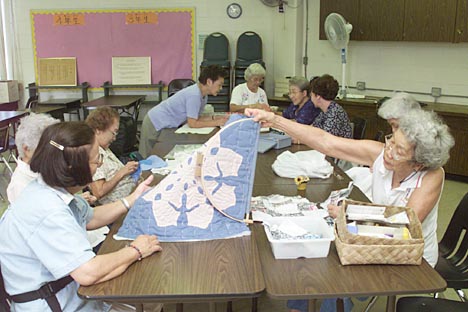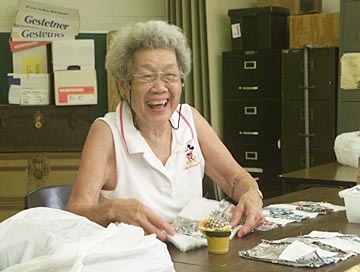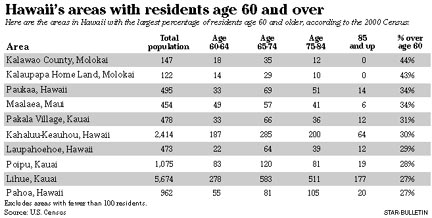


Hawaii seniors HANAKO MARUBAYASHI does not claim to know the secret to living a long, happy life, but she does have a few ideas: "Live for today. Don't worry or take things too seriously. As you get older, that gets easier to do. I don't look too far ahead," she said with a laugh.
redefine ohana
Their numbers are growing
and so are their needsGETTING GRAYER
Christine Donnelly / cdonnelly@starbulletin.com
At 84, healthy and active, Marubayashi is part of the fastest-growing demographic groups in Hawaii and the rest of the United States: people living longer lives, more independently and with fewer disabilities.
For Marubayashi, that means staying active, trying new things, joining clubs and making new friends.
Widowed for 13 years, Marubayashi is close to her daughter and cherishes her two grandchildren and one great-granddaughter. But the definition of ohana does not stop at blood relations for the retired seamstress, who also values spending time with folks closer to her own age.
"We have a good time together," she said recently, gesturing to a dozen or so women working together in a once-a-week Hawaiian quilting class at the Moiliili Senior Center, which is part of the Moiliili Community Center.

Besides quilting, Marubayashi enjoys sewing, arranging flowers and performing Japanese music.Florence Yamanaka of Ewa Beach, having raised four kids of her own and helped with six grandkids, is another active senior who relishes time with "friends who are like family."
She enjoys making Hawaiian quilts and Japanese dolls and volunteering for community groups. At age 73, Yamanaka has no plans to slow down. "There are a lot of things I want to do yet," she said.
According to the 2000 Census, the two fastest-growing age groups in Hawaii are the 75-to-84 group, up nearly 61 percent since the 1990 Census, and the 85-and-over group, up a whopping 69 percent.
It's not the huge baby-boom generation reflected in that increase, but their parents. So the trend will only continue as the boomers themselves age (the oldest now are in their mid-50s), living longer, healthier lives with the help of improved medical care, diet and exercise.
The rapid growth in the elderly population "certainly portends the kinds of demands the state faces," said Marilyn Seely, director of the state Executive Office of Aging.
But so far, she said, neither the state nor federal government has come up with enough money to pay for all the services needed to help seniors stay fit and independent, or to care for frailer, less healthy ones, or to lend a hand to those who simply grow so old that they need help completing daily tasks, such as housecleaning or grocery shopping.

"There are so many needs competing for limited dollars," said Seely, who noted that 85 percent of Hawaii's elderly live alone or with other family members, not in institutions. "The ohana is strong here -- we take care of our elders -- but it can be a hard job, and many families need some help."The Moiliili Senior Center is among those feeling the financial pinch. It is set to lose its state funding in 2003, the victim of budget cuts and competing needs, including paying for services for frailer, housebound elderly people.
The community center provides recreation, exercise and educational services to about 700 seniors a year. Among its most popular free or inexpensive classes are tai chi, yoga and other movement classes that help keep seniors fit, said Jill Kitamura, manager of MCC's senior program.
The budget cuts are especially tough knowing that the companionship, mental stimulation and physical exercise offered at places such as MCC help prevent the seniors from declining into frailty and dependence and reduce the need for more expensive alternatives such as nursing homes.
Seeking $200,000 from other sources, including government or private foundation grants and corporate donations, is a challenge made all the more urgent by how Kitamura considers her clients like family.
That feeling is echoed by Marubayashi, who relies on the senior center for benefits less tangible, and more valuable, than the latest quilting tips.
"I'm with my friends. We talk. We laugh," she said. "It's something to look forward to."